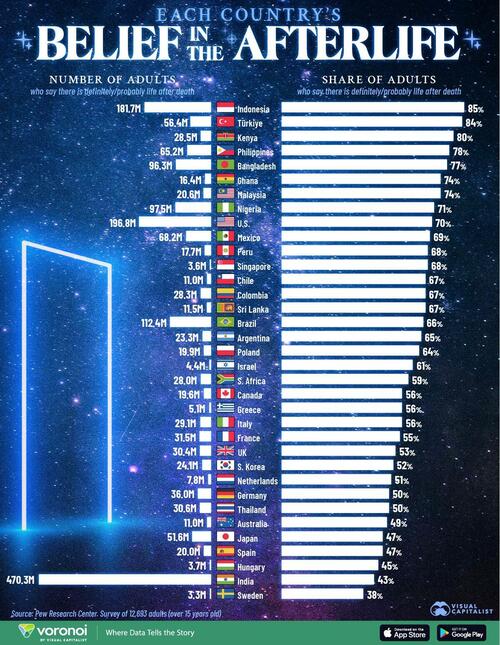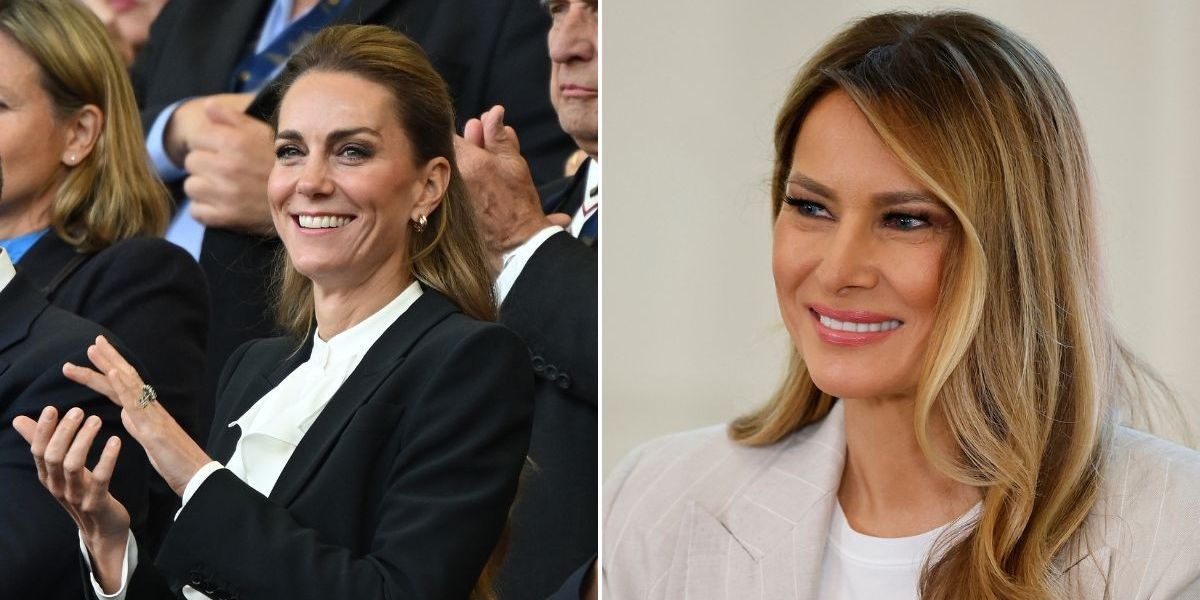Mothers and staff tell of global charity’s role in child disappearances under Assad regime
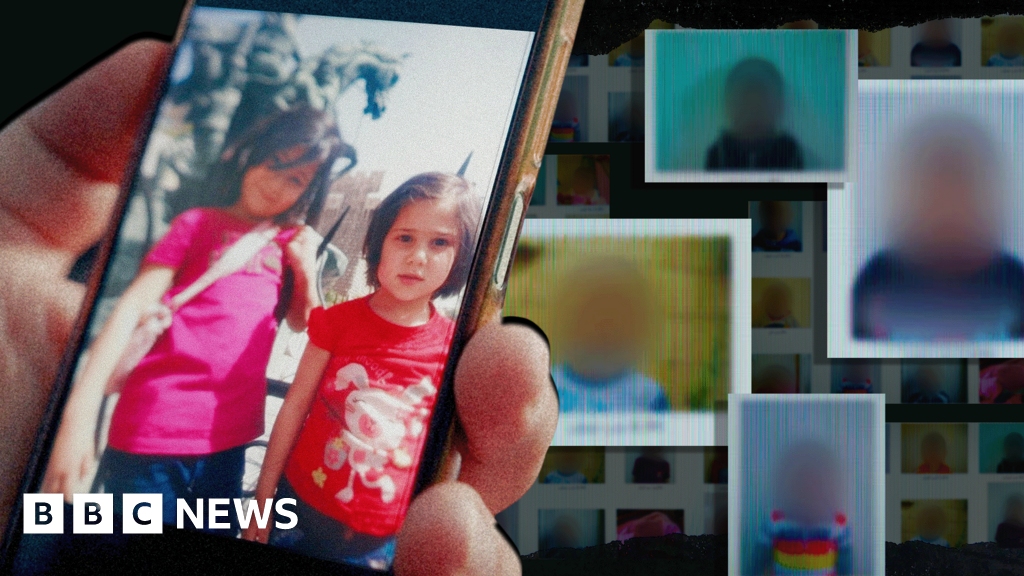
Haya Al Badarneh & Jess KellyBBC Eye Investigations

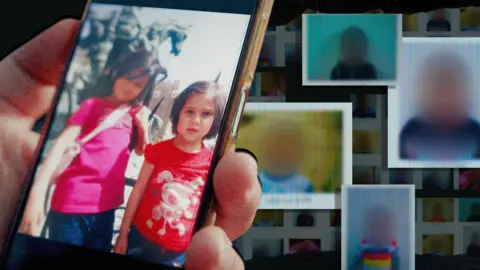 BBC
BBC
Reem al-Kari and her cousin Lama are searching through dozens of photos of children spread out on a desk. Lama thinks she spots one with a likeness to Karim, Reem’s missing son.
Karim was two-and-a-half when he and his father disappeared, in 2013 during Syria’s civil war, as they ran an errand. He is one of more than 3,700 children still missing since the fall, 10 months ago, of the Assad dictatorship. He would now be 15.
“Are his eyes green?” asks the man behind the desk, the new manager of Lahan Al Hayat, a Syrian-run children’s shelter which former first lady Asma al-Assad helped establish in 2013. He is looking at one of the photos the women have picked out, comparing it to a photo of Karim aged two.
“Yes,” comes the reply.
“The hairline…” the man muses. “There is a similarity but…” His voice trails off. The task is enormous.

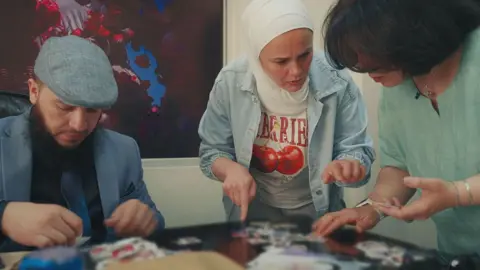 Jess Kelly / BBC
Jess Kelly / BBC
Lahan Al Hayat is one of several Syrian childcare facilities which were used to hold the children of detained parents during the 2011-2024 civil war. Instead of re-homing the children with their relatives, the youngsters were held in orphanages and used as political pawns. In some cases the children were falsely recorded as orphans, or their identities changed, making tracing them – then and now – all the more difficult.
When Assad’s dictatorship suddenly collapsed in December, journalists, activists and families had access to sources, locations and documents previously unimaginable under his decades-long rule. The BBC World Service has worked with investigative media organisation Lighthouse Reports and five other outlets, to build a database of 323 children hidden by the Syrian regime from their relatives in a network of orphanages. We did this by reviewing and authenticating thousands of leaked and gathered documents.
Analysis of these records shows the organisation running orphanages which took more children than any other was an Austria-headquartered charity, SOS Children’s Villages International. SOS operates in more than 130 countries and raises about €1.6bn ($1.9bn) a year, including from the UN, European governments and personal donations.
We spoke to more than 50 SOS whistleblowers. Several said most of the senior positions at SOS in Syria had been appointed directly by the Assad palace, and that Asma al-Assad – who, along with her husband Bashar, was sanctioned by the EU and the UK for human rights abuses – had an influential role in the organisation.
We were also told that the charity began “bringing in any child” regardless of their circumstances to obtain more funding.
SOS responded: “We do not offer financial rewards for increasing the number of orphans,” and denied any formal link between the charity and the Assad family.

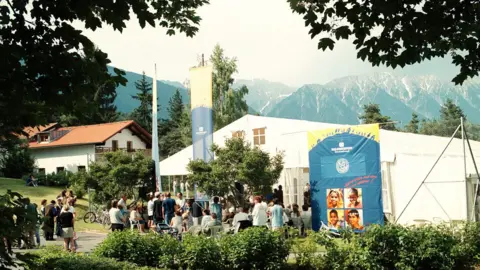 Getty Images
Getty Images
SOS has already admitted, following an internal review, that 140 children without proper documentation were taken in by SOS Syria between 2013 and 2018. It has said 104 of these were subsequently taken back by the Syrian intelligence services or the Social Affairs Ministry, and of whose whereabouts SOS now has no knowledge.
The charity has also said it had stopped receiving children of political detainees in 2018.
But we have seen paperwork indicating their transfer to SOS up until 2022.
We have also established SOS Syria:
- When requested by the Assad government or intelligence services to send children back to them, did not check who would be looking after them next
- Received children whose identities it knew had been changed and, in one case, itself gave a child in its care an official different name
- Complied with Syrian intelligence instructions that relatives should be refused permission to visit and should not be granted custody, or be given information about the children
- Forbade staff from showing the children photos of – or discussing – family
- Has been slow to, or has not, engaged with mothers seeking information since the regime fell which could help them find their children
SOS International told us: “We deeply regret that children were forcibly separated from their families and that families spent years without knowing where their children were. This should never have happened, and we are committed to learning from the independent investigations to ensure we do better in the future.”
Its interim CEO, Benoît Piot, added in an interview with us that the charity had been following the orders of the Syrian government which he called “a terror system” under Assad.
Many parents still have no idea what happened to their children. The quagmire of falsified and lost records for Syria’s missing children means surviving mothers and fathers are left to hunt from one institution to the next for any information at all.
This includes Reem, looking for her son Karim.
It is impossible for her to know if he was taken in by SOS or any other institution in Syria that took in the children of detainees. But she thinks the fact her husband was wealthy – putting him at risk under the cash-poor Assad regime – and was spotted in prison in 2016, makes it likely he was arrested, and therefore her son sent to an orphanage.

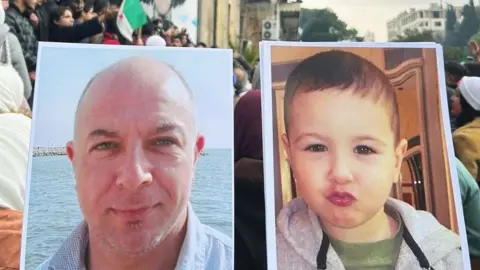 Reem al-Kari
Reem al-Kari
Before she drew a blank at Lahan Al Hayat, she had visited Syria’s Social Affairs Ministry.
There she was told the minister was abroad, the manager in charge of the missing persons file was on holiday, and then finally that work on missing children had been transferred to a security agency on the ministry’s fifth floor. Reem went upstairs, accompanied by a BBC film crew. We were promptly told to stop filming despite having permission to do so, and the ministry refused to provide Reem with any further assistance.
A new investigation into the fate of the children under the previous regime was announced by the ministry in May. But it has limited staff and resources, with just a few volunteers tasked with reviewing thousands of documents, and has yet to release any findings.
Reem next visited another orphanage known for taking in boys of Karim’s age. On her phone, she pulled up her son’s photo and showed it to the institution’s director. The woman responded with a silent shake of the head. Reem’s eyes filled with tears – a rare break in her steely composure.
Finally, she visited SOS Syria, which was led until recently by Samar Daaboul, the daughter of a close Assad aide. Ms Daaboul has denied her family links have influenced her work.
Reem was asked for Karim’s date of birth, but she pointed out to staff that this may not be of any use given records were often changed. Instead, she asked to see photos of the children SOS had taken in. It refused, citing the need to guard privacy.
A few weeks later, she received an email from SOS International to say the charity would respond to her within six months and recommending she also contact SOS Syria – the institution she had just visited – directly.
Other parents we have spoken to have told us they are still waiting for a response from SOS months after contacting it.
We asked Benoît Piot, the interim CEO of SOS Children’s Villages International, why paperwork from the Ministry of Social Affairs indicates children were being transferred to SOS up until 2022.
The team in Vienna was “not aware” of this, he said, adding that the external investigation it has launched into the children “forcibly placed with [SOS]… can get to the truth” and that SOS would note this finding and look into it.
We pointed out that SOS still operates in other human-rights abusing countries. Mr Piot stressed that the advice SOS International gives to its members is: “Don’t accept [children] if they have been separated for a bad reason.
“We are making sure that the admission of children in our programme is up to international standards,” he added.

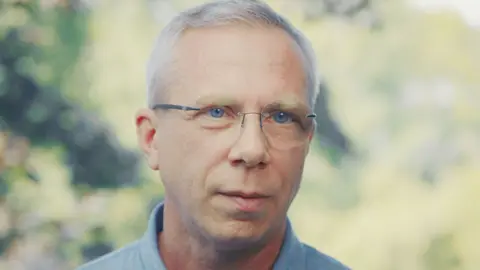 Jess Kelly / BBC
Jess Kelly / BBC
More than 50 former and current SOS employees – including four senior executives from SOS’s Vienna headquarters – have spoken to the BBC and its investigation partners. They paint a picture of little or slow action by the charity in response to multiple alerts SOS received from whistleblowers about the charity’s admission of detainees’ children in Syria.
“When SOS Syria raised these issues with SOS HQ… senior executives didn’t want to know the details and hid away from concrete action and responsibility,” said a former senior SOS International manager, who, like others we spoke to, asked to remain anonymous.
Another senior staff member at SOS International said the pressure to deal with “safeguarding issues and confront failures” had to come from the “bottom up”.
“There are loads of policies and procedures at SOS Children’s Villages for safeguarding children, but not much resource at the international level for checking and enforcing compliance,” they added.
And the former leader of one of the SOS Syria orphanages alleged the charity’s decision on who to admit was influenced by funding targets.
“The safety team, intake and reunification team’s standards were poor.
“SOS International had a total target they needed to reach for the donors. Early on, they didn’t reach it, so they started bringing in any child to meet the numbers and keep the funding.”
Unlike Reem, Omama Ghbeis has since been reunited with her children. But she says for the first two of the three years she was imprisoned as a result of her brother’s humanitarian work, she had no idea where they were.
Her daughters Layla and Layan had been taken in, aged four and eight, by SOS Syria.
Omama says she cannot forgive the charity for her children’s experiences, many of which have been echoed by other children’s families we have spoken to regarding SOS.

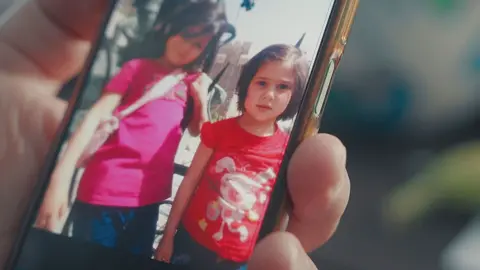 Ghbeis family / BBC
Ghbeis family / BBC
She says relatives tried to get in touch with her daughters but were told this was “forbidden”. The girls were not allowed to talk about, or see pictures of, their family, she adds. And Layla says that once, when she was missing her family a lot, an SOS staff member showed her photos on Facebook but that this was officially “forbidden”.
Once the girls had been reunited with their mother, they told her that the charity had changed their names.
“Layla told me that if anyone asked, she was to say her name was Layla Mossab,” Omama says.
She added that her other daughter was given a different first name too.
“And they used to call Layan: ‘Layal’. Layal Mossab,” says Omama.
“I don’t believe that this was an innocent mistake.”
The BBC and its partners in this investigation have confirmed that Layan was referred to as Layal Mossab in Syrian intelligence paperwork.
The girls were allowed to visit their mother in prison two years after she was first detained, in preparation for her release under a prisoner exchange that then fell through. By that point, Layan had forgotten her completely, Omama says, and recoiled when they met.
“Even the prison guards were in tears,” Omama tells us.
When the family was finally reunited, three years after they were first broken up, their long separation had created a distance between them, she adds.
“Each one of us was coming from a different world.”
Omama is angry at the role SOS Syria played in the three years she was away from the girls.
“I know that SOS is a humanitarian organisation, funded from abroad. So, it’s powerful. It’s not an organisation set up by the regime. Their complicity in the disappearing of children of detainees is… unforgivable,” she said.
For Reem, the search for Karim continues. As does the frustration.

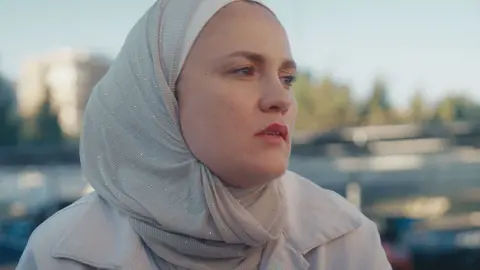 Jess Kelly / BBC
Jess Kelly / BBC
“It’s been six months since the liberation and yet there’s still no clear path for mothers looking for their children,” she says.
SOS Children’s Villages International says, despite most of its donors having already withdrawn funding for SOS Syria since the child detentions came to the public’s attention, “we are aiming to keep SOS Syria running for many years to come, and working to ensure continuity of essential services for children currently in our care”.
It added that it was investigating whether any informal link had existed between the charity and Asma al-Assad, but denied there had been a formal connection.
Former chairperson of the board of SOS Syria, Samar Daaboul, resigned in May 2025. She denies her family links to the regime had any influence on her work there and told us Asma al-Assad only visited SOS once.
She emphasises her work has “always been characterised by integrity and professionalism, serving the best interests of the child”.
Syria’s Social Affairs and Labour Ministry did not respond to our team’s request for comment.
In May, it announced a new joint ministerial committee to investigate what happened to children under the Assads.
The Assad family, who fled to Russia after the fall of the regime, also did not respond to our request to comment.
Further reporting by Hajar Chaffag and Rosie Garthwaite
Syria’s Stolen Children is part of a joint project with Lighthouse Reports, The Observer, Der Spiegel, SIRAJ, Trouw, and Women Who Won the War.
Recent Top Stories
Sorry, we couldn't find any posts. Please try a different search.


